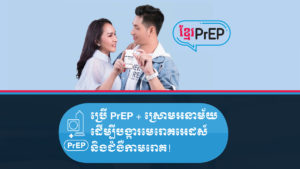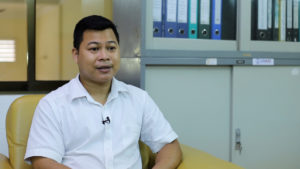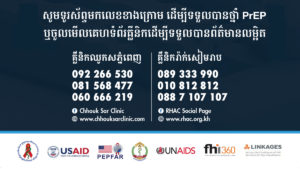AIDS is an illness that has devastated communities and families, but a cure has still not been found. The disease has wounded society as not only does it bring about severe illness, but also discrimation and prejudice towards those who suffer from it, even in today’s Cambodia.

According to UNAIDS, the number of people living with HIV reached 73,000 by the end of 2019, accounting for 0.5% of the world’s population.
PrEP, which stands for Pre-exposure prophylaxis, refers to a medication that can prevent HIV contraction, even after engaging in unprotected sex with a HIV patient. The effectiveness of PrEP can be as high as 96%, after only a week of regular medication. Although PrEP started gaining popularity in the West, people in Thailand and Singapore are also incredibly aware of it and its uses. While in Cambodia, the same cannot be said, where there is limited information and accessibility.
Focus talked to Dr Yun Phearun, executive director of Chhouk Sar HIV clinic with eight years experience in the field, to learn more about the drug.

Who can use PrEP? Can you be either heterosexual or homosexual to use the drug?
PrEP mainly targets people at high risk, which includes sex workers, men who have sex with men (MSM), transgender people and drug addicts. Both heterosexual and homosexual are qualified to recieve PrEP service if they are at high risk. A high risk individual may have multiple partners and unprotected sexual intercourse.
What is the process to receive PrEP?
There are four stages to being able to receive PrEP from the Chhouk Sar clinic.
- Stage 1: Customers arrive and receive a leaflet about PrEP. While waiting, they can learn in detail about PrEP. If they are interested in it, they can register to receive it.
- Stage 2: Customers will be transferred to the consulting department. They will have a discussion with a consultant to further understand PrEP and its benefits, as well as its dosage schedule. The consultant will also conduct a risk assessment of the patient’s likelihood HIV and STIs contraction.
- Stage 3: Customers must have their blood tested for HIV.
-
- If the results are negative: customers might be able to receive the PrEP service.
- If the results are positive: they will not be able to apply for PrEP. However, they will meet a consultant and receive life-prolonging medication at Chhouk Sar.
- Stage 4: Customers will be screened during a full body health checkup. A doctor will evaluate blood pressure, pulse and other illnesses such as diabetes, high blood pressure and kidney-related disease.
If the customer is healthy, they will receive PrEP medicine from Chhouk Sar clinic, who will also provide information and updates throughout.
What are side effects of PrEP medication?
The side effects of PrEP medication vary from person to person. However, common side effects include headache, dizziness and a low fever, which will disappear within a week. Some people may not experience any side effects.
PrEP medication might affect the kidneys, but only if customers have kidney-related illnesses. A kidney checkup is required before prescription of the medication. PrEP does not affect other medications being taken for underlying medical conditions or depression.
Pregnant women are also approved to take the medication as it does not affect the fetus.
Chhouk Sar clinic always advises using a condom at the same time as taking PrEP, as the medication does not prevent STIs.
Is it PrEP available free of charge to Cambodians?
PrEP, as well as other HIV-related services, is available to Cambodian nationals in Chhouk Sar clinic, especially people who are at high risk.
What is the current data on PrEP takers from the clinic?
There have been 208 people who received PrEP from the clinic, but only 164 people remain active with medication. You don’t have to take PrEP forever, if a customer wants to stop because they no longer belong to a high risk group, they can make a request to their doctor.
Editor’s Note: This interview has been edited for length and accuracy.




